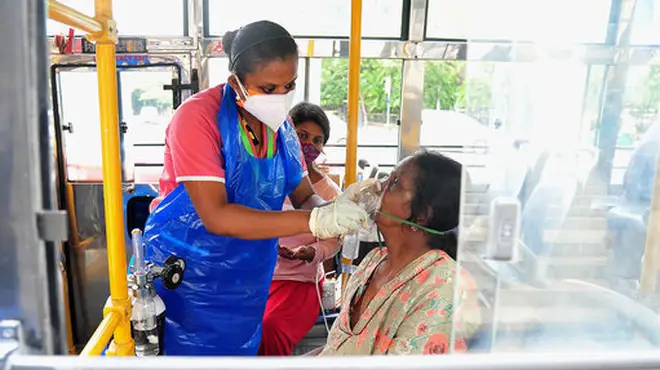
Vanessa Feltz 3pm - 6pm
14 May 2021, 15:25

A rare "black fungus" is being detected on more and more Covid patients in India.
In the first wave of the pandemic, India was recording over 90,000 daily Covid cases at its peak.
Despite numbers dropping considerably in February, a second wave saw the daily number of cases hike from 11,000 and continue to rise at an alarming rate.
To date, India has reported 24 million cases and a grim 262,000 deaths.
Medical facilities have been overwhelmed by the number of inpatients, with oxygen supplies dwindling and the demand increasing between 6-8% every day.
Train carriages have also been transformed into medical wards owing to the shortages of hospital beds. In March, around 4,000 coaches were adapted to help treat Covid patients. Sports halls and other large areas have also been used to cater for the sick.
Perhaps some of the most striking images to come from the pandemic are the scenes from Delhi, where families are being forced to say goodbye to loved ones in carparks, where mass pyres have been prepared to cope with the sheer volume of bodies.
To add to the already strenuous impacts of the pandemic in India, patients with the new variant are experiencing mucormycosis, a rare and deadly "black fungus" that invades the brain.
Here's what we know about mucormycosis and the affects it's having on Covid patients in India.
READ MORE: Indian variant: How many cases are in the UK? Is it more dangerous?
READ MORE: Indian variant: Boris Johnson 'ruling nothing out' amid worries about delay to roadmap
The rare disease is caused by a group of moulds called mucormycetes, which are found in soil, plants, decaying fruits and vegetables and manure.
As well as having a detrimental impact on the sinuses, it has the capacity to invade the brain and the lungs, and is potentially life-threatening for individuals with underlying health conditions.
Medical professionals have suggested that the use of steroids has contributed to the rise in mucormycosis, because although they are used to help reduce inflammation of the lungs in Covid patients, they also reduce immunity and can increase blood sugar levels in diabetic and non-diabetic patients.
Covid patients' immunity has been compromised already by the coronavirus, and so they are more susceptible to mucormycosis. There seems to be a pattern where diabetic people, in particular, are affected.
Professor Peter Collignon, who sits on the World Health Organisation's expert committee, says the fungus is "is very serious, has a high mortality, and you need surgery and lots of drugs to get on top of it once it takes hold."
Mumbai-based eye surgeon Dr Askhay Nair added: "It is ubiquitous and found in soil and air and even in the nose and mucus of healthy people."

Coronavirus: Most affected countries as death toll passes one million
People with mucormycosis may experience redness around the eyes and nose, a fever, headache, pain, blood in vomit and black nasal discharge.
Some have complained of pain in the sinuses and on one side of their face, as well as blurred vision and tooth ache.
With a mortality rate of 50%, mucormycosis is not only difficult to treat, but expensive.
Colligon said: “We usually put people with suppressed immune systems in what we call positive pressure rooms when they are admitted to hospital to reduce the risk of acquiring infections like mucormycosis, because by increasing the pressure in the room, so that the air flows out into the corridor, there’s less likely to be fungus or other things circulating in the air that the patient can breathe it in."
He added: “Of course, a positive pressure room is the last place you want to put a Covid patient as it can spread the virus, making [mucormycosis] harder to prevent.”
In the state of Gujarat, around 300 cases have been reported.
Dr Rahul Baxi, a diabetologist based in Mumbai, says he has treated 800 diabetic Covid patients in the past year, and none of them contracted the fungal disease.
A senior government official also said there's "no big outbreak" as of yet.